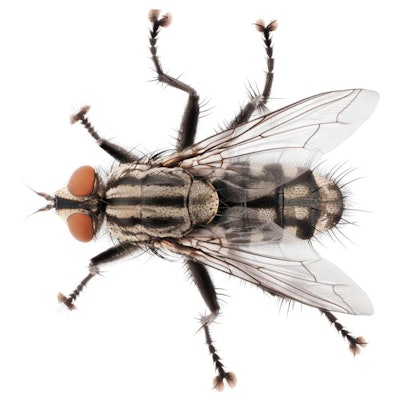
African swine fever virus has been detected in blood-sucking insects that are common on pig farms.
According to a newly published study, ASF viruses have been detected in blood-sucking insects, particularly in those found on farms where pigs are present. Results of the research — carried out in Romania — suggests that common insects such as midges and stable flies may be a means of viral transmission. However, this link was not conclusively proven.
The study — titled “Entomological survey to study the possible involvement of arthropod vectors in the transmission of African swine fever virus in Romania” — has been published in the journal of the European Food Safety Authority (EFSA).
Poland reviews ASF situation
As an update on the country’s developing ASF situation, a video conference took place last week to assess progress in the control of the disease in Poland and its neighbors in Europe.
Despite the best efforts of the authorities and pig owners, ASF continues to spread, according to the national chief veterinary officer Bogdan Konopka. He highlighted the enormous economic consequences of the disease when a country is forced to halt exports of live pigs and products.
Biosecurity is the most effective way to protect domestic pigs from the infection, he said. Measures need to be maintained by farmers and hunters, according to Konopka. Meetings are held regularly with veterinary authorities with Poland’s neighboring states, Germany and the Czech Republic, towards a coordinated approach.
According to the latest report from the chief veterinary office, a further 124 ASF outbreaks have been confirmed in Polish wild boar, bringing the total so far this year to 910.
Involving a total 249 animals, the new outbreaks occurred in eight provinces. Of the latest outbreaks, 86 were in the western province of Lubusz, which accounts for 577 of the total this year so far. All the latest cases were suspected in the period February 22 to March 15, and confirmed March 8-22.
During March, Poland confirmed its first outbreak in domestic pigs since October 2020.
New ASF outbreaks in Romania include commercial farms
Since the first ASF outbreaks were confirmed in 2018, Romania’s animal health agency has been reporting new cases in domestic pigs and wild boar.
Over the past week, 67 new outbreaks have been registered officially with the World Organisation for Animal Health (OIE). Directly involving a total of more than 28,800 pigs in the north and west of the country, these occurred between February 17 and March 31.
A significant development was the involvement of one large commercial farm among those affected. Located in the Macea district of Arad county, the premises housed almost 22,500 pigs. ASF was also detected over this period at a smaller farm with approximately 5,600 animals in Satu Nou district in the same county.
At three locations, one or more infected pig carcasses were found discarded, but all other outbreaks occurred in backyard herds of up to 77 pigs. Since the first outbreaks in this region in June 2018, ASF has directly impacted 44,248 pigs.
Meanwhile, Romanian veterinary authorities have officially reported a further 26 ASF outbreaks in domestic pigs occurring in the south of the country.
Occurring over the same period — mid-February to the end of March — these covered nine counties. While backyard herds of no more than 60 pigs were mostly affected, there was one outbreak at a farm with around 11,780 animals at Sohatu in Calarasi. In total, the latest outbreaks in this region involved more than 12,000 pigs.
More cases among Germany’s wild boar
The number of wild boar in Germany testing positive for the ASF virus has reached 935. According to the national veterinary agency, the Friedrich-Loeffler Institute, this is an increase of 20 from April 1. Latest cases were found in the two districts of Brandenburg and one region of Saxony. All these have recorded previous outbreaks in the wild population.
With 844 confirmed cases since September 2020, the eastern state of Brandenburg continues to be the worst-affected state. Positive cases have been detected in five districts, including most recently the city of Frankfurt (Oder), according to the agriculture ministry.
Neighboring Saxony is the only other state where ASF-positive cases have so far been detected among wild boar. Its total stands at 70 as of April 6. This is just one more than the previous week, reports the agriculture ministry. All infected cases so far have been found in the district of Görlitz.
ASF situation in wild boar elsewhere in Europe
Among the European states reporting new cases of ASF in wild boar to the OIE over the past week is Romania.
In the north and west of the country, 245 cases were confirmed among animals found between mid-February and the end of March. A further 40 wild boar tested positive for the ASF virus in the south of Romania over that period.
In Hungary, a further 116 cases among wild boar have been registered with the OIE, and three in Latvia.
Ukraine declares ASF ‘resolved’ in 3 regions
Over the past week, OIE has received declarations from Ukraine’s veterinary authority that ASF has been “resolved” in the oblasts of Mykolaiv, Kiev and Odessa. These followed three, two and one confirmed outbreak in these regions, respectively, at the end of last year.
View our continuing coverage of the global African swine fever situation.

















